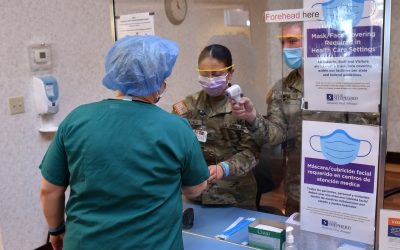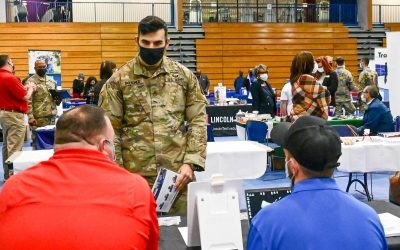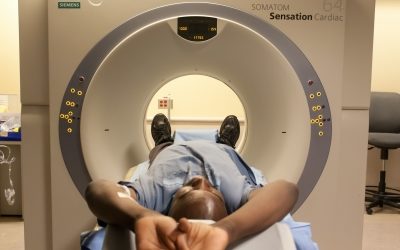Beta blockers have been shown to improve outcomes in patients with heart failure with reduced ejection fraction (HFrEF), a complex syndrome characterized by impairment of the left ventricle resulting in a low left ventricular ejection fraction (LVEF).
Prevalence of Asymptomatic COVID-19 Might Be Lower Than Suspected
A clear definition of the frequency of asymptomatic COVID-19 infection is important for studies estimating the prevalence of SARS-CoV-2 infection, as well as for public health measures to control the spread of this virus and its variants.
New Mothers at MHS Facilities Less Likely to Use Opioids
MHS patients are less likely to fill a prescription for opioids after delivery of a child than those receiving care from civilian facilities.
Beyond SPRINT: Drug Regimen, Systolic Blood Pressure Affect CVD
The landmark Systolic Blood Pressure Intervention Trial (SPRINT) quickly changed the standard treatment of patients at high cardiovascular risk in the U.S.
VHA Offers Inconsistent Benzodiazepine Dosing for AWS
Hospitalized patients with alcohol withdrawal syndrome (AWS) —which is not uncommon—often have increased intensive care unit (ICU) and hospital lengths of stay, more hospital-acquired infections or sepsis and higher in-hospital mortality.
SUD Treatment Linked to Lower VHA COVID-19 Mortality
The risk for hospitalization from COVID-19 is elevated for patients with substance use disorders (SUD), but the link between SUDs and mortality from SARS-CoV-2 isn’t as clear.
Cardiologist Brings Novel Cardiac Mapping Technology to DCVAMC
Shortly after Christmas, while the hospital was bracing for the tidal wave that would be omicron, the DCVAMC made history, becoming the first VA in the nation to use new cardiac mapping technology to perform a cardiac ablation procedure.
Monitor Cancer Survivors for Thyroid Disorders
Patients who survive cancer often face second malignant neoplasms (SMN), which are among their most serious long-term adverse health conditions.
Study Finds Disparities in VA Prostate Cancer Care
African-American men are disproportionately affected by prostate cancer, but it remains unclear whether racial and ethnic disparities occur in equal-access settings at the national level.
Opioid Safety Initiative Affected Cancer Pain Control
How has pain management for cancer patients been affected by the opioid epidemic and related risk reduction policies?
Hospitalized Veterans Have High Mortality Rates from Acute Kidney Injury
More than a quarter of patients with acute kidney injury died within a year of hospitalization at the VHA, according to a 10-year study that ended in late 2017.
Why Do Cataract, TKA Surgeries Often Cost More at VA vs. Outside Care?
New study raises questions about which veterans requiring cataract and total knee replacement surgeries received community care, as opposed to the cases kept within the VA system.
Brain Stimulation Improves Memory in Veterans with Early Alzheimer’s Disease
Transcranial magnetic stimulation, or TMS, is a technique that uses strong magnetic pulses to stimulate regions of the brain, producing electric currents that may affect neuron activity.
Senate Passes Scaled-Down Bill Providing Healthcare to Burn Pit Victims
Legislation to extend healthcare to millions of veterans suffering from the effects of toxic exposure to burn pits passed the U.S. Senate unanimously last month. Advocates caution, however, that much more still needs to be done.
Prolonged Exposure Therapy Showed Some Advantages in Treating PTSD
Post-traumatic stress disorder is a prevalent and serious mental health problem among veterans. Of the veterans who received VA healthcare in 2019, 12.1% had PTSD, including 26.5% of veterans who served in Iraq or Afghanistan.
Why Does Sex Make a Difference in Statin Use Among Older Veterans?
Cardiovascular disease is the No. 1 cause of death for women in the United States, and female veterans are at particular risk.
VA Researchers Track COVID-19 Pandemic’s Impact on Healthcare Workers
As the COVID-19 pandemic exploded and Rebecca Hendrickson, MD, PhD, began hearing reports from friends and colleagues who were in the middle of the first waves in New York and Italy, she found their stories all too familiar.
‘Pan-Coronavirus’ Vaccine Developed by Army Research Shows Promise
Based on recent preclinical study results, the Spike Ferritin Nanoparticle (SpFN) COVID-19 vaccine is showing significant promise.
National Guard Pandemic Response Proves Motto ‘Always Ready, Always There’
For more than two years, the National Guard has risen to the challenges posed by COVID-19 as the pandemic has disrupted lives, supply chains, health care, education and more.
Transition to Civilian Life Remains Difficult Years After Military Discharge
Each year, more than 200,000 servicemembers leave the U.S. military—a transition that can prove difficult.
Palo Alto VA Tests Feasibility of Liquid Biopsy as Lung Cancer Screening Tool
The VA Palo Alto Health Care System stepped up to be the first testing site for an early detection study in lung cancer that uses a blood assay as a screening mechanism.
Wounding Therapies Show Promise in Skin Cancer Prevention
The most common form of cancer, nonmelanoma skin cancer (NMSC) — composed primarily of basal cell carcinoma and squamous cell carcinoma — affects about 3.3 million people annually.
Which Military Personnel Are Most at Risk of Skin Cancer? Study Has Answers.
Since the 1990s, both melanoma and nonmelanoma skin cancer have become more prevalent in the United States. Across the nation, more than 9,500 people are diagnosed with skin cancer every day.
VA Studies Continue to Demonstrate High COVID-19 Vaccine Effectiveness
From the time the COVID-19 mRNA vaccines became available in late 2020, VA studies have been crucial to understanding their effectiveness in real life.
How the DCVAMC Has Weathered Years of the COVID-19 Pandemic
The latter half of December and the first weeks of the new year were trying times for hospitals as the Omicron variant began sweeping across the country, causing infection rates and hospitalizations to rise to levels unprecedented even during the earliest months of the pandemic.
VA Study: Alarming Rise in CVD Complications After Initial COVID-19 Recovery
When it comes to cardiovascular complications, the acute care of COVID-19 symptoms in veterans appears to be only the first stage for what, in some cases, turns out to be a longer-term healthcare crisis.
Paradoxical Bronchospasm Might Go Unrecognized at VHA Facilities
It is rare, but inhaled short-acting β2-adrenergic agonists can elicit paradoxical bronchospasm (PB), which may be fatal. A new study raised concerns that the condition might be unrecognized at the VHA.
What Affects COPD Patients’ Response to Home Pollution
How COPD patients respond to particulate pollution based on personal characteristics and systemic responses is not well characterized. That’s why a new study sought to find out.
Military, Veterans More Likely to Be Screened for Many Types of Cancer
While some cancer diagnoses are disproportionately high among VA patients, the cause does not appear to be inadequate screening, according to a new study.
Factors Affecting Which COPD Patients Complete Pulmonary Rehab
Which veterans with chronic obstructive pulmonary disease are likely to participate in and complete a pulmonary rehabilitation program?







